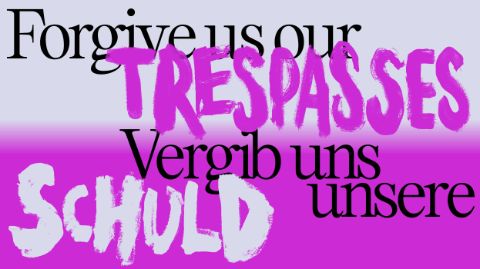Forgive Us Our Trespasses / Vergib uns unsere Schuld
Of (Un)Real Frontiers, Of (Im)Moralities and Other Transcendences
heimatenExhibition, Performances, Panels, Talks, Activations
14.9.–8.12.2024

The project Forgive Us Our Trespasses / Vergib uns unsere Schuld—Of (Un)Real Frontiers, Of (Im)Moralities, and Other Transcendences invites artists, scholars, activists, and others to deliberate on religious, social, class, national, sexual, disciplinary, and other forms of trespassing. It is a research and exhibition project that puts at the fore the question of normativity and by and for whom the demands of normativity are made. The project employs varying narratives of trespassing as a means of resistance—without asking for forgiveness, for one doesn’t need to ask for forgiveness for being a ‘Gastarbeiter’ or a descendant of one; one doesn’t need to be apologetic about seeking refuge especially if the rights of refugees are supposed to be covered by UNHCR conventions; one doesn’t need to ask for forgiveness for not believing in someone else’s God or for believing in one’s own Gods and ancestors; one doesn’t need to be apologetic about being queer; one does not need to ask for forgiveness for advocating for a better environment and future by occupying and thereby reclaiming Indigenous lands, however counterproductive to capitalist endeavours of extraction that claim to be normative.
The project Forgive Us Our Trespasses / Vergib uns unsere Schuld—Of (Un)Real Frontiers, Of (Im)Moralities, and Other Transcendences thinks of real and metaphorical dimensions of trespassing as a tool for asserting one’s rights, humanity, and community, trespassing as a means of epistemic disobedience, as a means of subversion within heteronormative patriarchal and white supremacist structures that propagate gender, racial, sexual, and class inequalities.
Trespassing as a possibility of bringing together a multitude of voices, of bodies, of positions —physically, mentally, and spiritually—to think about the constructions of real and unreal frontiers, the constructs of what is moral or immoral, ethical or unethical, correct or incorrect, just or unjust. By putting our bodies on the line performatively, the project also invites us to cogitate on psychosomatic interferences within certain spaces reserved for ‘normative’ bodies. Artists are thus invited to trespass HKW— to resignify its spaces, occupy the lawns, create new common grounds, and make them inhabitable by other trespassers.
The project asks the question: if the norm has been inherently exclusive, is there a possibility that the abnormal would be inclusive and more accommodating, and what role can artists play in the imagination of the abnormal as a method? An abnormal that isn’t concerned with undoing, but that must be more concerned with giving space for a multiplicity of ways of existing and co-existing side-by-side and even intertwined. As trespassers we choose to take the route of the hypotenuse, but we acknowledge that there is space for everyone else who might wish to take the other way via the 90° angle.
To put it in other words, the project Forgive Us Our Trespasses / Vergib uns unsere Schuld—Of (Un)Real Frontiers, Of (Im)Moralities, and Other Transcendences is about queering all that claims normativity. It is about making crooked, about going down the winding paths of life, it is about getting lost and finding oneself again, it is about errantry as a method.
To the curatorial statement
With contributions by:
Ibrahim Ahmed, Esvin Alarcón Lam, Ana Alenso, Ulf Aminde, Myriam Omar Awadi, Casa Kuà, Mariana Castillo Deball, Isaac Chong Wai, Steven Cohen, Lizza May David, Victor Ehikhamenor, Jessica Ekomane, Theo Eshetu, Alfredo Esquillo Jr., FOKN Bois, Hikaru Fujii, Dani Gal, Surya Suran Gied, Patricia Gomez, María Jesús González, Olivier Guesselé-Garai, Dorothy Iannone, Leiko Ikemura, Mansour Ciss Kanakassy, Rebecca Pokua Korang, Ananias Léki Dago, Søren Lind, Antje Majewski, Shehzil Malik, Sliman Mansour, Babá Murah, I Gusti Ayu Kadek Murniasih, Nazanin Noori, Ahmet Öğüt, Tanja Ostojić, José Alejandro Restrepo, Felix de Rooy, Larissa Sansour, Ahlam Shibli, Sim Chi Yin, Nedko Solakov, Andrew Tshabangu, Linda-Philomène Tsoungui, Nasan Tur, Sandra Vásquez de la Horra
Mediathek
Publication and gallery of the project are available in the HKW Mediathek.